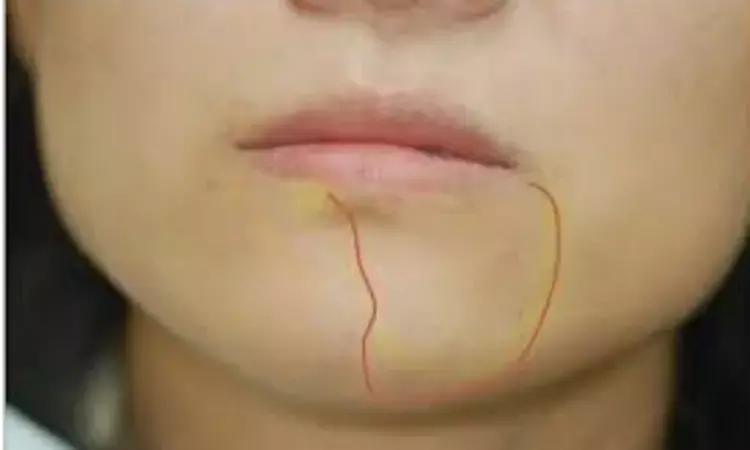- Home
- Medical news & Guidelines
- Anesthesiology
- Cardiology and CTVS
- Critical Care
- Dentistry
- Dermatology
- Diabetes and Endocrinology
- ENT
- Gastroenterology
- Medicine
- Nephrology
- Neurology
- Obstretics-Gynaecology
- Oncology
- Ophthalmology
- Orthopaedics
- Pediatrics-Neonatology
- Psychiatry
- Pulmonology
- Radiology
- Surgery
- Urology
- Laboratory Medicine
- Diet
- Nursing
- Paramedical
- Physiotherapy
- Health news
- Fact Check
- Bone Health Fact Check
- Brain Health Fact Check
- Cancer Related Fact Check
- Child Care Fact Check
- Dental and oral health fact check
- Diabetes and metabolic health fact check
- Diet and Nutrition Fact Check
- Eye and ENT Care Fact Check
- Fitness fact check
- Gut health fact check
- Heart health fact check
- Kidney health fact check
- Medical education fact check
- Men's health fact check
- Respiratory fact check
- Skin and hair care fact check
- Vaccine and Immunization fact check
- Women's health fact check
- AYUSH
- State News
- Andaman and Nicobar Islands
- Andhra Pradesh
- Arunachal Pradesh
- Assam
- Bihar
- Chandigarh
- Chattisgarh
- Dadra and Nagar Haveli
- Daman and Diu
- Delhi
- Goa
- Gujarat
- Haryana
- Himachal Pradesh
- Jammu & Kashmir
- Jharkhand
- Karnataka
- Kerala
- Ladakh
- Lakshadweep
- Madhya Pradesh
- Maharashtra
- Manipur
- Meghalaya
- Mizoram
- Nagaland
- Odisha
- Puducherry
- Punjab
- Rajasthan
- Sikkim
- Tamil Nadu
- Telangana
- Tripura
- Uttar Pradesh
- Uttrakhand
- West Bengal
- Medical Education
- Industry
Extraction of third molars performed before complete root formation can mitigate mental nerve paresthesia risk

Japan: A recent study published in the International Journal of Oral and Maxillofacial Surgery has shown that the risk of mental nerve paresthesia can be reduced by extracting the third molar before complete root formation.
The study identified the completion of root formation of the mandibular third molar, and deformation of the mandibular canal as the key risk factors for mental nerve paresthesia, post-extraction. The findings highlight the importance of timing in third molar extractions.
Mental nerve paresthesia is a severe postoperative complication of mandibular third molar extraction. Paresthesia usually manifests as burning, tingling, prickling, itching, numbness, or any deviation from normal sensation No study seemed to have examined the relationship between the surface morphology of the mandibular third molar roots and the possibility of mental nerve paresthesia after tooth extraction.
To fill this knowledge gap, Hiroki Sakakura, Japanese Red Cross Aichi Medical Center Nagoya Daini Hospital, Nagoya-shi, Aichi, Japan, and colleagues aimed to examine the root morphology of the mandibular third molars according to age using dental cone beam computed tomography (CBCT). They also evaluated the possibility of mental nerve paresthesia following tooth extraction.
The study involved 1216 patients who underwent mandibular third molar extractions. The root morphology was studied of 1534 teeth in 791 patients who had CBCT performed before surgery. Factors evaluated were hypercementosis, age, periodontal ligament atrophy of the mandibular third molar roots, complete or incomplete formation of the mandibular third molar roots, and mandibular canal deformation.
The study revealed the following findings:
- Mandibular third molar root formation was completed between the ages of 19 and 30 years.
- Complete formation of the mandibular third molar roots and deformation of the mandibular canal were identified as risk factors for mental nerve paresthesia.
"These findings indicate that the risk of mental nerve paresthesia could be mitigated if the extraction of third molars is performed before complete root formation," the researchers concluded.
Reference:
Sakakura H, Hayashi Y, Sugimoto K, Matsubara A. Relationship between age-related changes in mandibular third molar roots and the possibility of mental nerve paresthesia after tooth extraction. Int J Oral Maxillofac Surg. 2024 Jan 9:S0901-5027(23)00948-7. doi: 10.1016/j.ijom.2023.12.008. Epub ahead of print. PMID: 38199951.
Dr Kamal Kant Kohli-MBBS, DTCD- a chest specialist with more than 30 years of practice and a flair for writing clinical articles, Dr Kamal Kant Kohli joined Medical Dialogues as a Chief Editor of Medical News. Besides writing articles, as an editor, he proofreads and verifies all the medical content published on Medical Dialogues including those coming from journals, studies,medical conferences,guidelines etc. Email: drkohli@medicaldialogues.in. Contact no. 011-43720751


